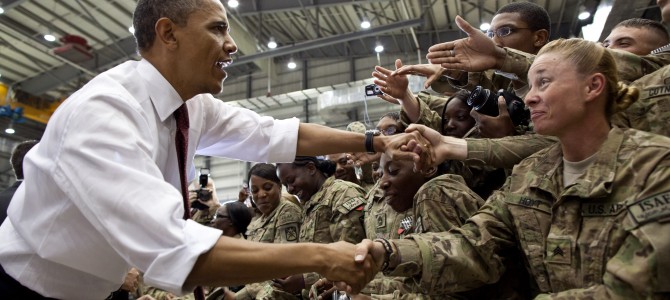
Though countless pundits have noted that President Barack Obama’s West Point address was a grab bag of false choices, few have pointed out that it also featured a generous helping of historical revisionism.
And it didn’t end with the speech. If a person were to take foreign policy talking heads seriously, he might be left with the impression that Obama was grappling with yet another neocon mess. After five years of running the war, we were acting like it was 2008 and Obama bore absolutely no responsibility for the loss of life and treasure that accompanied his Afghanistan war strategy. (A strategy, incidentally, that we’re now pretending was a success.)
Obama announced that he plans to end the broad U.S. military commitment in Afghanistan by 2016, leaving only—only—9,800 American troops on the ground so that, one imagines, they can maintain some order. It’s about time. But whatever your take is, the president’s assertion that we can “achieve the objectives that took us to war in the first place” and can “begin a new chapter in the story of American leadership around the world” is absurd.
The mention of a “new chapter” intimates that the old chapter was thrust upon him. But who, exactly, was president five years ago? Or three years ago? Editorial boards seem to have forgotten that it was Obama who escalated our involvement soon after taking office, sending 30,000 additional military personnel there—a nearly 50 percent jump. And troop levels did not peak in 2010, when the president was already talking about winding down the war, but in 2012, when more than 68,000 troops were in Afghanistan. Casualties spiked accordingly. Over 70 percent of the Afghan war’s fatalities occurred under Obama’s watch. How many Americans do you think are aware of that fact? None of the guests on the Sunday news shows seemed to think it worthy of mention.
If we use the benchmarks laid out by Obama, the surge was a failure. As The New York Times reported in 2012—although the piece treats Obama like a bystander to unfolding events—the surge was already being viewed as ineffective on the ground:
The American military says it has now fully withdrawn the last of the 33,000 ‘surge troops’ sent to pacify Afghanistan two years ago, but they are leaving behind an uncertain landscape of rising violence and political instability that threatens to undo considerable gains in security, particularly in the former Taliban strongholds in the south and southwest.
In the past two years, circumstances have not gotten better. We’ve not achieved “the objectives that took us to war in the first place”—not the real ones, and not the administration’s concocted ones.
In his West Point address, Obama boasted that hundreds of thousands of highly trained Afghan troops and policemen are now on the job. What he fails to mention is that those forces have been accused of widespread misconduct (including rape and child abuse) and are typically unable or unwilling to do anything about the rampant criminality, terrorism, and anarchy that plagues their nation. The president bragged that those Afghan forces have secured an election in “which citizens voted for the first democratic transfer of power in their history.” It’s a democracy, Obama failed to note, that functions under a theocratic “constitution” and recently passed laws that not only further subjugate women but basically undermine all the liberal tenets Obama says are our sacred duty to protect.
Under Obama (and under Bush before him) we aren’t only enabling illiberalism, we are bankrolling a kleptocracy—or as Obama might call it, “empowering partners.” The U.S. government has funneled tens of millions of dollars in cash to Hamid Karzai, who has, despite running this racket, constantly antagonized Western supporters. A recent reports by the Special Inspector General for Afghanistan Reconstruction found that there were billions more missing from the $63 billion the U.S. allocated for reconstruction. The money is gone, and one imagines it didn’t find its way into the pockets of the local shopkeeper or construction worker.
Not that more money has helped. A few month ago, a report for the Joint Chiefs of Staff concluded that Afghanistan’s government was rooted in such a deep culture of corruption that is not only impervious to kindhearted American intervention but grew substantially worse the more we gave. According to the study, Washington helped ratchet up corruption by flooding Afghanistan with more cash than it could absorb through any legitimate channels or institutions.
And through all the failures of Obama-led policies, it doesn’t seem that our presence has helped diminish al-Qaeda’s reach—even in Afghanistan. According to a new State Department report, nearly 7,000 more people were killed in terrorist attacks worldwide in 2013 than in 2012, and most of them were killed by al-Qaeda or some other jihadi terrorist group.
How any of this meets American objectives—either the idealistic ones or the realist ones—is a mystery. That Obama can claim his Afghan strategy was a success without a tidal wave of criticism only indicates how much this administration gets away with.
Democrats have long portrayed Afghanistan as the good war that was forsaken to fight the unnecessary bad war in Iraq. So Obama focused on Afghanistan. Why is he getting a free ride after blowing it? Now, it would be partisan hackery to blame any single administration for the complex and multifaceted troubles that we face in that part of the world. Maybe there is no reform or military strategy that can live up to the quixotic objectives we set for ourselves or for them. But that doesn’t mean Obama should be allowed to rewrite history or avoid culpability for his failures.
Follow David Harsanyi on Twitter.









